“The gut is not just a digestive organ, it’s also a mental health hub.” This concept is revolutionizing our understanding of mental wellbeing. Research has shown a significant link between the gut microbiome and mental health conditions such as depression and anxiety.
We’re exploring the fascinating relationship between probiotics and mental health. The gut-brain axis is crucial in understanding how probiotics can influence brain function and mood. By examining the latest research, we can uncover how these beneficial bacteria may help alleviate symptoms of depression and anxiety, promoting overall mental wellbeing.
Key Takeaways
- The connection between gut health and mental health is significant.
- Probiotics may help alleviate symptoms of depression and anxiety.
- The gut-brain axis plays a crucial role in mental health.
- Certain probiotics strains show promise in mental health improvement.
- Incorporating probiotics into your regimen may support mental wellbeing.
Understanding the Gut-Brain Connection
Emerging evidence suggests that the gut and brain are connected through a bidirectional communication system. This connection, known as the gut-brain axis, involves complex interactions between the central nervous system, the gastrointestinal tract, and the microorganisms residing within it.
The Gut-Brain Axis Explained
The gut-brain axis represents a sophisticated network that enables the exchange of signals between the brain and the gut. This bidirectional communication is facilitated through multiple pathways, including neural, immune, and endocrine mechanisms. The enteric nervous system, often referred to as the “second brain,” contains over 100 million neurons and can function autonomously from the central nervous system.
The key components of the gut-brain axis include:
| Component | Function |
|---|---|
| Neural Pathways | Enable direct communication between the brain and the gut through the vagus nerve. |
| Endocrine Signals | Hormones produced by the gut influence the brain, and vice versa. |
| Immune Mechanisms | The gut microbiome influences the immune system, which in turn affects the brain. |
How Your Microbiome Affects Your Mind
The microbiome, comprising trillions of microorganisms in the digestive tract, plays a crucial role in the gut-brain axis. These microorganisms produce neurotransmitters, regulate inflammation, and influence neural signaling, thereby impacting mental health conditions such as depression and anxiety. Understanding the interplay between the microbiome and mental health can provide insights into novel therapeutic approaches targeting gut health to improve mental wellbeing.
Research has shown that individuals with mental health disorders often exhibit alterations in their gut microbiota. By modulating the gut microbiome through probiotics or other interventions, it may be possible to positively influence mental health outcomes.
The Science Behind Probiotics and Mental Health
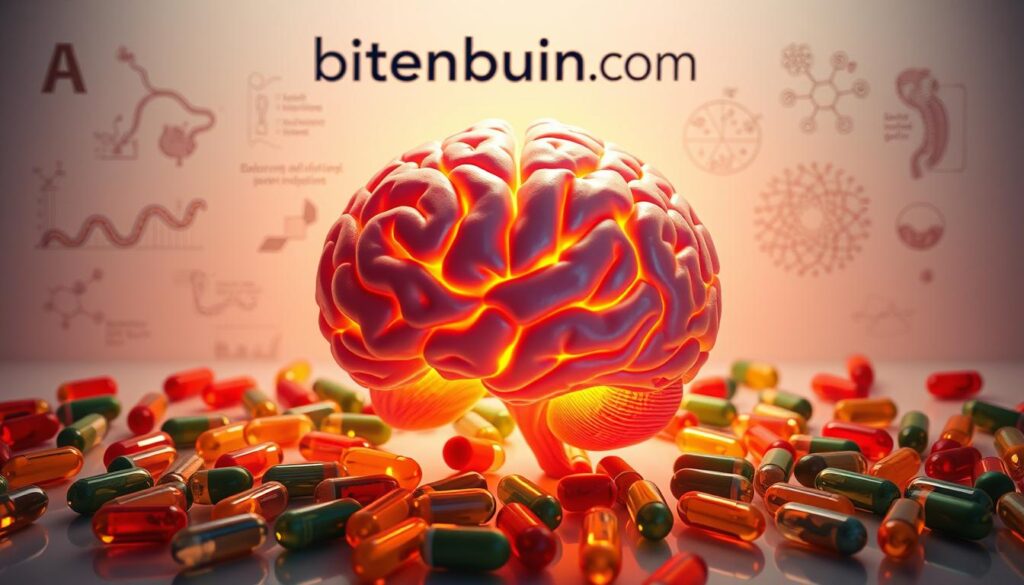
As our understanding of the gut-brain connection deepens, the role of probiotics in supporting mental health has become increasingly evident. The intricate relationship between the gut microbiome and the brain is now recognized as a critical factor in maintaining mental wellbeing.
What Are Probiotics?
Probiotics are defined as live microorganisms that confer health benefits on the host when administered in adequate amounts. These beneficial bacteria play a crucial role in maintaining or restoring the balance of the gut microbiota, which is essential for overall health. Research has shown that probiotics can have a positive impact on various aspects of health, including mental health.
How Probiotics Influence Neurotransmitters
The gut-brain axis is a bidirectional communication network between the central nervous system and the enteric nervous system. Probiotics influence this axis by producing or stimulating the production of neurotransmitters such as serotonin, GABA, and dopamine, which are crucial for regulating mood and cognitive functions. Studies have demonstrated that certain probiotics strains can alleviate symptoms of depression and anxiety by modulating neurotransmitter activity.
The Role of Inflammation in Mental Health
Chronic inflammation has been strongly linked to various mental health disorders, including depression and anxiety. The effects probiotics have on the gut can lead to inflammation reduction, thereby potentially alleviating symptoms of these conditions. By strengthening the intestinal barrier, probiotics can prevent the translocation of inflammatory compounds into the bloodstream, which in turn can affect brain function and contribute to improved mental health outcomes.
In conclusion, the science behind probiotics and mental health highlights the potential of these beneficial microorganisms to positively influence depression, anxiety, and overall mental health. By understanding how probiotics interact with the gut-brain axis and influence neurotransmitter production and inflammation, we can better appreciate their role in supporting mental wellbeing.
7 Ways Probiotics Impact Your Mental Wellbeing
Probiotics have emerged as a crucial factor in maintaining mental wellbeing by influencing various physiological processes. The gut-brain axis (GBA) is a complex communication network that links the enteric nervous system of the gastrointestinal tract to the central nervous system. Probiotics play a significant role in this axis by producing neurotransmitters, reducing inflammation, and affecting cognitive function.
Serotonin Production and Mood Regulation
Probiotics significantly influence serotonin production, with approximately 95% of this “feel-good” neurotransmitter being produced in the gut. This direct impact on serotonin levels contributes to mood regulation and emotional stability. By enhancing serotonin production, probiotics can help alleviate symptoms of depression and anxiety.
Stress Response and Cortisol Levels
Research has shown that certain probiotic strains can help normalize the hypothalamic-pituitary-adrenal (HPA) axis, reducing excessive cortisol production and improving the body’s response to stress. This stress reduction capability is crucial for maintaining mental health, as chronically elevated cortisol levels can lead to anxiety and depression.
Inflammation Reduction
The anti-inflammatory properties of specific probiotics play a crucial role in mental health, as inflammation has been strongly linked to depression through various pathways, including neurotransmitter metabolism and neural circuit function. By reducing inflammation, probiotics can help mitigate some of the physiological factors contributing to depression.
Cognitive Function Enhancement
Studies indicate that probiotic supplementation may enhance cognitive function, including memory, attention, and decision-making, by improving neural signaling and reducing brain fog associated with gut inflammation. This enhancement of cognitive abilities is vital for overall mental health.
To summarize the impact of probiotics on mental wellbeing, let’s examine the following table:
| Mental Health Aspect | Probiotics’ Impact | Benefit |
|---|---|---|
| Serotonin Production | Increased serotonin levels | Improved mood regulation |
| Stress Response | Normalized HPA axis | Reduced anxiety |
| Inflammation | Reduced inflammatory markers | Lower risk of depression |
| Cognitive Function | Enhanced neural signaling | Better memory and decision-making |
By understanding the various ways probiotics impact mental wellbeing, we can better appreciate the importance of maintaining a healthy gut microbiome for overall mental health and anxiety management.
The Role of Probiotics in Mental Health Improvement

As research continues to uncover the complexities of the gut-brain axis, the importance of probiotics in mental health improvement becomes increasingly evident. The human gut microbiome, comprising tens of trillions of microorganisms, plays a vital role in influencing various physiological processes, including those related to mental health.
Mechanisms of Action
Probiotics exert their beneficial effects on mental health through multiple mechanisms. They modulate neurotransmitter production, regulate the stress response system, and reduce systemic inflammation. By strengthening the intestinal barrier, probiotics prevent harmful substances from entering the bloodstream, thereby protecting brain function and mental health.
Key mechanisms include:
- Modulation of neurotransmitter production, such as serotonin and dopamine, which are crucial for mood regulation.
- Regulation of the stress response system, including the hypothalamic-pituitary-adrenal (HPA) axis, to mitigate the effects of stress on mental health.
- Reduction of systemic inflammation, which is associated with various mental health conditions, including depression and anxiety.
Potential Benefits for Mental Health Conditions
Research has demonstrated that certain probiotic strains can alleviate symptoms of depression and anxiety by altering the composition and function of the gut microbiome. The potential benefits of probiotics extend to various mental health conditions, including major depressive disorder, generalized anxiety disorder, and stress-related disorders.
Potential benefits include:
- Reduction in symptoms of depression and anxiety.
- Improvement in cognitive function and emotional regulation.
- Enhanced resilience to stress.
By understanding the mechanisms through which probiotics operate and their potential benefits for mental health conditions, we can harness their therapeutic potential to improve mental wellbeing.
Research on Probiotics for Depression
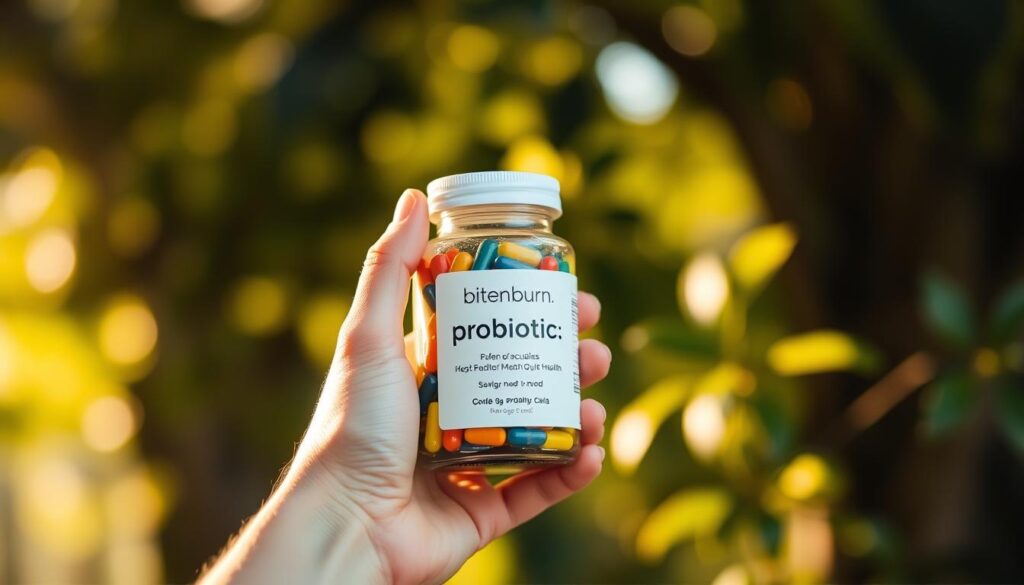
The potential of probiotics in treating depression is a burgeoning area of research. As we continue to understand the intricate relationship between the gut microbiome and mental health, the role of probiotics in managing depressive symptoms has garnered significant attention.
Clinical Studies and Their Results
Clinical research on probiotics for depression has expanded significantly over the past decade. Multiple randomized controlled trials have shown promising results for specific bacterial strains in reducing depressive symptoms. For instance, a landmark study published in the Journal of Psychiatric Research found that a combination of Lactobacillus acidophilus, Lactobacillus casei, and Bifidobacterium bifidum significantly reduced Beck Depression Inventory scores in patients with major depressive disorder compared to placebo.
Research has also demonstrated that certain probiotic formulations can reduce inflammatory markers associated with depression, including C-reactive protein and pro-inflammatory cytokines. This suggests a biological mechanism for their antidepressant effects. In a study on patients with major depressive disorder, those who received probiotics reported a significant decrease in depressive symptoms compared to the placebo group.
- Clinical trials have shown that probiotics can decrease depression scores significantly.
- Probiotics have been found to reduce serum levels of insulin, oxidative stress, and high-sensitivity C-reactive protein concentrations.
- A combination of specific bacterial strains has been shown to be effective in reducing depressive symptoms.
How Probiotics Compare to Traditional Treatments
When compared to traditional antidepressants, probiotics generally show a more favorable side effect profile. However, they typically demonstrate more modest efficacy when used alone, suggesting their optimal use may be as complementary rather than replacement therapy.
Research indicates that probiotics may be particularly effective for depression with comorbid gastrointestinal symptoms, highlighting the importance of the gut-brain connection in certain subtypes of depressive disorders. As such, probiotics could offer a valuable adjunct to traditional treatments for depression, potentially enhancing their effectiveness.
For more information on the use of probiotics in mental health, you can visit Healthline’s article on probiotics and mental health, which provides a comprehensive overview of the current research and potential benefits.
Probiotics for Anxiety Management

Probiotics have emerged as a potential tool in managing anxiety, backed by a growing body of research. As we explore the connection between probiotics and mental health, it becomes clear that these beneficial bacteria play a significant role in reducing anxiety symptoms.
Evidence from Clinical Trials
Several clinical trials have investigated the impact of probiotics on anxiety, yielding promising results. A study published in Psychiatry Research found that daily consumption of Lactobacillus plantarum for 12 weeks significantly reduced anxiety scores and stress-related gastrointestinal symptoms in participants with high anxiety levels.
The relation between probiotic consumption and altered cytokine balance in people diagnosed with generalized anxiety disorder has also been reported. Research has shown that certain probiotic strains can reduce physiological markers of stress, including cortisol levels and inflammatory cytokines, providing objective evidence for their anxiety-reducing effects.
Stress Reduction Capabilities
The stress reduction capabilities of probiotics appear to work through multiple pathways, including modulation of the hypothalamic-pituitary-adrenal axis, which regulates cortisol production and the body’s stress response. This is particularly beneficial for individuals with comorbid anxiety and gastrointestinal disorders, as the treatment simultaneously addresses both the psychological symptoms and the gut dysfunction that often exacerbate each other.
By reducing anxiety and stress, probiotics can contribute to an overall improvement in mental wellbeing. As research continues to uncover the mechanisms behind the anxiolytic effects of probiotics, their potential as a complementary therapy for depression anxiety becomes increasingly evident.
Best Probiotic Strains for Mental Health
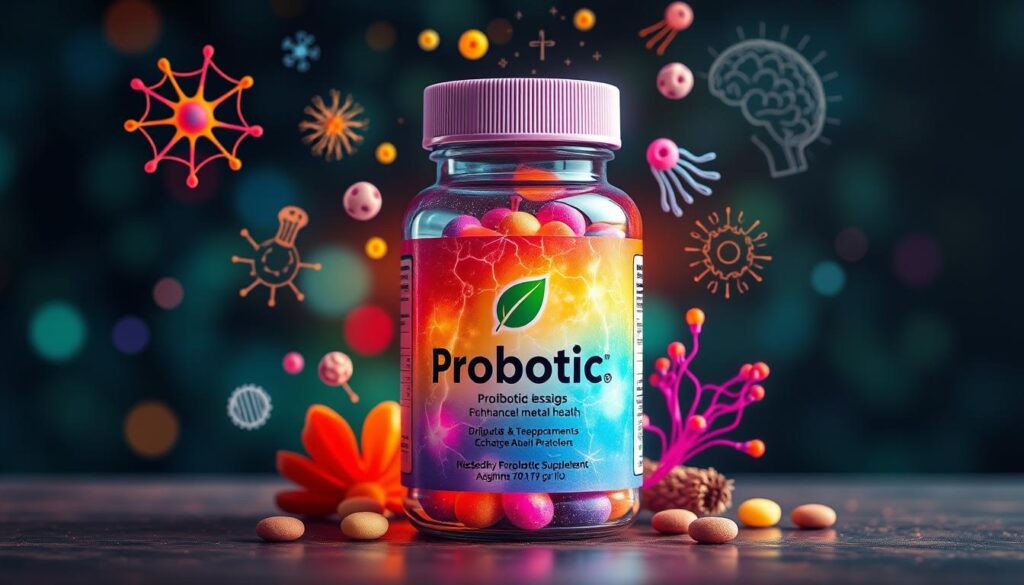
The connection between probiotics and mental health is becoming increasingly clear, with certain strains standing out. Research has identified specific probiotic strains that show particular promise for mental health benefits, with Lactobacillus and Bifidobacterium genera demonstrating the strongest evidence for psychological effects.
Lactobacillus Strains and Their Benefits
Lactobacillus acidophilus has been shown to influence GABA production in the gut, potentially reducing anxiety symptoms through this inhibitory neurotransmitter that helps calm neural activity. Additionally, Lactobacillus casei Shirota has demonstrated significant effects on stress-related symptoms and has been studied extensively for its ability to reduce cortisol levels and improve mood in multiple clinical trials.
Bifidobacterium Strains and Their Effects
Bifidobacterium longum NCC3001 stands out in research for its ability to reduce depression scores and decrease limbic activity in response to negative stimuli, as demonstrated in functional MRI studies. Furthermore, Bifidobacterium breve has shown promise for cognitive enhancement and stress reduction, with studies indicating improvements in both psychological symptoms and inflammatory markers following supplementation.
By understanding the specific benefits of different probiotic strains, individuals can make informed decisions about their mental health support. Incorporating these beneficial bacteria into one’s regimen may offer a valuable adjunct to traditional mental health treatments.
Probiotics and Specific Mental Health Conditions
Probiotics have been increasingly studied for their potential benefits in managing specific mental health conditions. As our understanding of the gut-brain axis expands, research is shedding light on how probiotics can influence various mental health disorders.
Major Depressive Disorder
Major depressive disorder (MDD) has been linked to alterations in the gut microbiome. Studies have shown that individuals with MDD often exhibit distinct microbial patterns compared to healthy controls. Clinical trials have demonstrated that certain probiotic strains, such as Lactobacillus acidophilus and Bifidobacterium bifidum, can be effective as adjunctive treatments alongside conventional antidepressants. By modulating the gut-brain axis, these probiotics may help alleviate depressive symptoms.
Generalized Anxiety Disorder
Generalized anxiety disorder (GAD) is another condition where probiotics have shown promise. Research has indicated that specific probiotic interventions can reduce both psychological symptoms and physiological markers of anxiety. Regular supplementation with certain bacterial strains has been associated with decreased anxiety scores. This suggests that probiotics could be a valuable adjunct in managing GAD.
Irritable Bowel Syndrome and Mental Health
The bidirectional relationship between irritable bowel syndrome (IBS) and mental health is well-documented, with up to 60% of IBS patients experiencing comorbid anxiety or depression. Probiotic interventions targeting the gut microbiome have been shown to improve both gastrointestinal symptoms and psychological wellbeing in IBS patients. This highlights the integrated nature of gut and mental health.
| Mental Health Condition | Probiotic Effects | Key Findings |
|---|---|---|
| Major Depressive Disorder | Adjunctive treatment with probiotics | Improved depressive symptoms with Lactobacillus acidophilus and Bifidobacterium bifidum |
| Generalized Anxiety Disorder | Reduced anxiety symptoms | Decreased anxiety scores with specific probiotic strains |
| Irritable Bowel Syndrome | Improved gastrointestinal and mental health symptoms | Up to 60% of IBS patients experience comorbid anxiety or depression |
In conclusion, probiotics show significant potential in managing various mental health conditions, including major depressive disorder, generalized anxiety disorder, and irritable bowel syndrome. By targeting the gut microbiome, probiotics offer a promising avenue for improving both gastrointestinal and mental health symptoms.
The Gut Microbiota in Depression and Anxiety
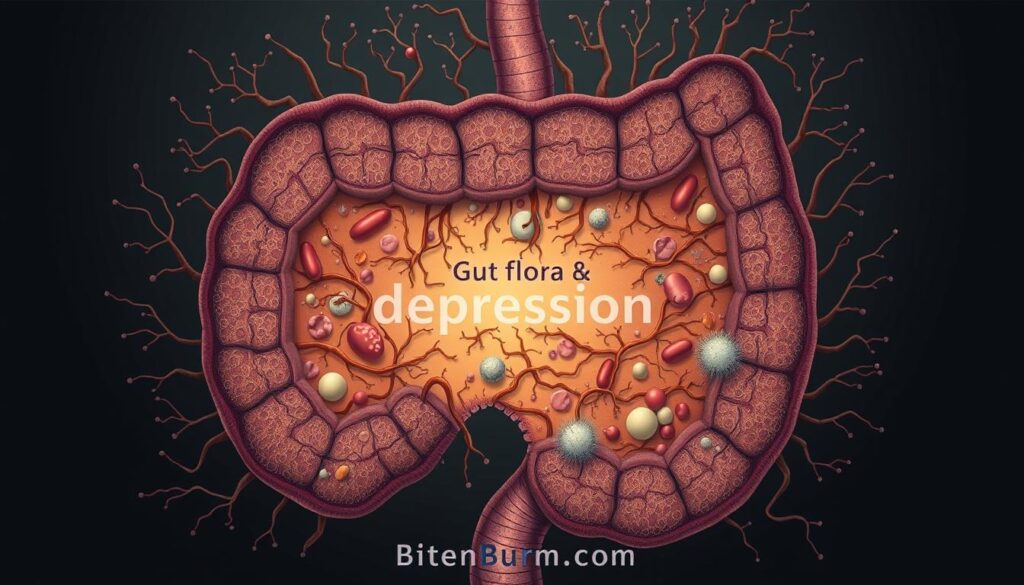
The intricate relationship between our gut microbiota and mental health has become a focal point of research, particularly in understanding depression and anxiety. The composition or alteration of gut microbiota can significantly affect psychological symptoms in individuals with these conditions.
Research has consistently shown that individuals with depression and anxiety often exhibit distinct gut microbiota compositions compared to healthy controls. This difference is characterized by reduced bacterial diversity and altered ratios of key bacterial phyla. Dysbiosis, or an imbalance in the gut microbial community, has been linked to increased intestinal permeability, systemic inflammation, and altered neurotransmitter production, all of which can contribute to depressive and anxiety symptoms.
Dysbiosis and Mental Health Symptoms
Dysbiosis is a critical factor in the manifestation of mental health symptoms. Studies using advanced sequencing technologies have identified specific bacterial signatures associated with depression, including decreased levels of Lactobacillus and Bifidobacterium species and increased levels of certain Bacteroidetes. As one study noted, “alterations in the gut microbiota are associated with changes in brain function and behavior, suggesting a gut-brain axis that is relevant to depression and anxiety.”
Restoring Balance Through Probiotics
The restoration of microbial balance through probiotic supplementation represents a promising approach for addressing the underlying biological factors contributing to depression and anxiety. Clinical research has shown that targeted probiotic interventions can help normalize gut microbiota composition, reduce inflammatory markers, and improve both gastrointestinal and psychological symptoms in individuals with depression and anxiety disorders. As a result, probiotics have emerged as a potential adjunct treatment for managing depressive symptoms and anxiety.
By understanding the complex interplay between the gut microbiota and mental health, we can better appreciate the potential benefits of probiotics in managing depression and anxiety. As research continues to evolve, the therapeutic applications of probiotics in mental health are likely to expand, offering new avenues for treatment.
Probiotic Supplements for Mental Health
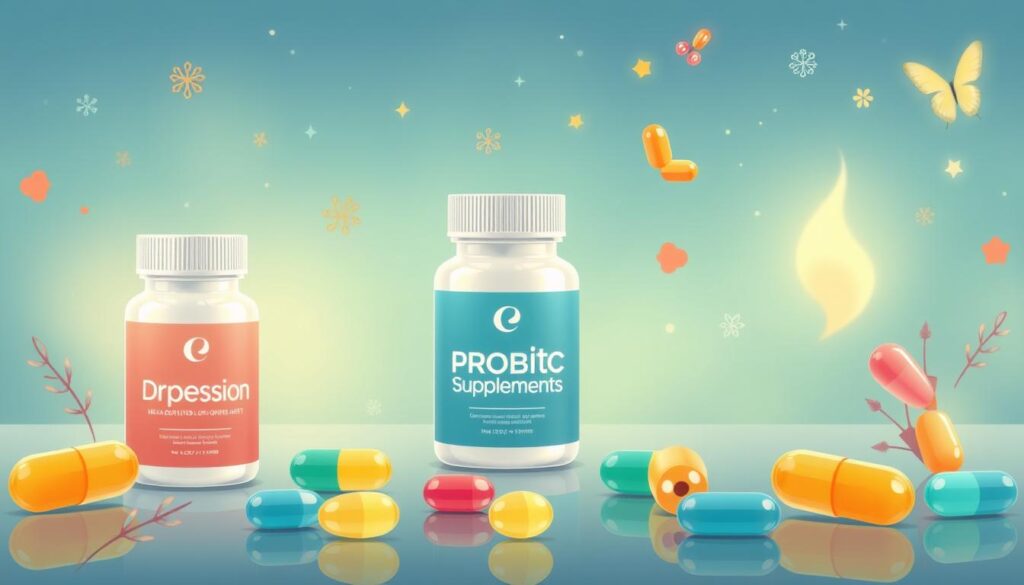
When it comes to managing depression and anxiety, probiotic supplements have emerged as a potential adjunct therapy. As we explore the benefits of probiotics for mental health, it’s essential to understand what to look for in a supplement and how to use it effectively.
What to Look for in a Mental Health Probiotic
Selecting the right probiotic supplement for mental health benefits requires careful consideration. We should look for products containing clinically studied strains such as Lactobacillus acidophilus, Lactobacillus casei, Bifidobacterium longum, and Bifidobacterium bifidum, which have demonstrated psychological effects in research.
The colony-forming unit (CFU) count is crucial, with most successful clinical trials using formulations containing at least 1-10 billion CFUs per serving. This ensures that sufficient bacteria reach the intestines alive. Additionally, we should choose products from reputable manufacturers that guarantee potency through the expiration date and have undergone third-party testing for purity and bacterial viability.
Recommended Dosages and Usage Guidelines
When it comes to dosage, we should follow the manufacturer’s recommendation. There’s no evidence that taking more than the recommended amount offers any extra benefits. Most clinical studies showing mental health benefits from probiotics have used intervention periods of at least eight weeks, suggesting that consistent, daily supplementation for two months or longer may be necessary before experiencing significant psychological improvements.
It’s also important to consult with a healthcare provider before starting supplementation, especially if we’re currently taking medications for depression or anxiety. Probiotics may interact with certain treatments, and a healthcare professional can provide personalized guidance.
By choosing the right probiotic supplement and following the recommended usage guidelines, we can potentially support our mental health and wellbeing. While probiotics are not a replacement for established treatments for depression and anxiety, they may offer a valuable adjunct therapy.
Probiotic-Rich Foods to Improve Your Mood

A growing body of research suggests that probiotic-rich foods can positively impact mental health. By incorporating these foods into your diet, you can potentially alleviate symptoms of depression and anxiety, leading to an improved quality of life.
Fermented Foods and Their Benefits
Naturally fermented foods offer a delicious and accessible way to incorporate beneficial probiotics into your diet. Options like yogurt, kefir, sauerkraut, kimchi, and kombucha provide diverse bacterial strains that may support mental wellbeing.
Traditional fermented foods from various cultures have been associated with mental health benefits for centuries. Modern research now confirms the psychological effects of these probiotic-rich dietary staples.
Creating a Probiotic-Rich Diet Plan
Creating a probiotic-rich diet plan involves incorporating a variety of fermented foods throughout your daily meals. For example, you can have yogurt with breakfast, kimchi with lunch, and kefir as an afternoon snack.
For optimal mental health benefits, it’s essential to combine probiotic-rich foods with prebiotic foods like garlic, onions, bananas, and asparagus, which provide the fiber that beneficial bacteria need to thrive in your gut.
By making these dietary adjustments, you can harness the potential of probiotics to support your mental health and overall wellbeing.
Combining Probiotics with Other Mental Health Treatments
The potential of probiotics to complement traditional mental health treatments has garnered significant attention in recent research. As we continue to understand the intricate relationship between the gut microbiome and the brain, the integration of probiotics into treatment plans for depression and anxiety is emerging as a promising strategy.
Probiotics as an Adjunct to Medication
Research increasingly suggests that probiotics may work most effectively for mental health when used as complementary interventions alongside established treatments rather than as standalone therapies. When combined with antidepressant medications, certain probiotic strains have shown potential to enhance treatment efficacy, possibly by improving medication absorption, reducing side effects, or addressing biological aspects of depression not targeted by the drugs. Several clinical trials have demonstrated that adding probiotics to standard antidepressant treatment results in greater symptom improvement than medication alone, particularly for physical symptoms of depression and anxiety.
Integrating Probiotics with Psychotherapy
The integration of probiotics with psychotherapy represents an emerging approach that addresses both the psychological and biological aspects of mental health conditions simultaneously. Cognitive-behavioral therapy and other evidence-based psychotherapies may be enhanced by concurrent probiotic use, as the biological improvements in gut-brain communication could potentially facilitate the psychological changes targeted in therapy. This holistic approach may offer new avenues for treating depression anxiety and other mental health challenges.
It’s crucial to note that while probiotics may be helpful, they don’t replace therapy, medication, or other treatment depression treatments. Patients should work with their healthcare provider to develop a comprehensive treatment plan that may include probiotics as a complementary therapy.
Potential Side Effects and Considerations
While probiotics are generally safe, there are some potential side effects and considerations to keep in mind. As we explore the benefits of probiotics for mental health conditions such as depression and anxiety, it’s crucial to understand the possible effects of probiotics on the body.
Common Side Effects of Probiotic Use
Some individuals may experience temporary digestive symptoms when first starting probiotic supplementation, including mild bloating, gas, or changes in bowel movements. These initial side effects typically resolve within a few days to weeks as the digestive system adapts to the new bacterial strains. However, persistent or severe symptoms should prompt discontinuation and consultation with a healthcare provider.
- Mild bloating and gas
- Changes in bowel movements
- General gastrointestinal distress
Who Should Avoid Probiotics
Certain individuals should exercise caution or avoid probiotics altogether. Those with severely compromised immune systems, critical illnesses, or specific genetic conditions affecting intestinal barrier function may be at risk of adverse effects from probiotics.
| Condition | Risk Level | Recommendation |
|---|---|---|
| Weakened immune system | High | Avoid probiotics |
| Cancer | High | Consult healthcare provider |
| Short bowel syndrome | Moderate | Consult healthcare provider |
It’s essential to consult with a healthcare provider before starting probiotic supplementation, especially if you have any underlying medical conditions or are taking medications such as antibiotics or antifungal treatments.
The Future of Psychobiotics Research
The field of psychobiotics is on the cusp of a revolution, with new research shedding light on the complex relationship between probiotics and mental health. As we continue to uncover the mechanisms by which probiotics influence our mental wellbeing, we’re gaining a deeper understanding of the potential benefits and limitations of these microorganisms.
Emerging Studies and Promising Directions
Emerging studies are investigating the potential of next-generation psychobiotics, including genetically modified bacteria designed to produce specific neurotransmitters or anti-inflammatory compounds targeted at mental health conditions such as depression and anxiety. A recent pilot study demonstrated the efficacy of a novel probiotic strain in reducing symptoms of anxiety in individuals with generalized anxiety disorder.
The development of advanced microbiome testing technologies is enabling more precise characterization of individual gut bacterial compositions, potentially allowing for personalized probiotic recommendations based on one’s unique microbial profile. This advancement is crucial, as research has shown that the optimal bacterial strains and dosages may vary significantly between individuals based on their existing microbiome, genetic factors, and specific mental health symptoms.
| Research Area | Current Focus | Future Directions |
|---|---|---|
| Probiotic Strains | Identifying specific strains for mental health benefits | Developing genetically modified bacteria for targeted therapy |
| Dosing Guidelines | Establishing optimal dosages for depression and anxiety | Personalized dosing based on individual microbiome profiles |
| Mechanisms of Action | Understanding how probiotics influence neurotransmitters and inflammation | Investigating the role of probiotics in gene expression and neural signaling |
Personalized Probiotic Approaches
Personalized probiotic approaches represent a promising frontier in psychobiotics research, acknowledging that the optimal bacterial strains and dosages may vary significantly between individuals. Future research will likely focus on identifying biomarkers that can predict which individuals are most likely to respond to specific probiotic interventions, moving toward a precision medicine approach to psychobiotic therapy.
By integrating advanced microbiome analysis with machine learning algorithms, researchers may be able to develop predictive models that identify the most effective probiotic strategies for individual patients. This personalized approach has the potential to revolutionize the treatment of mental health conditions such as depression and anxiety.
How to Start Using Probiotics for Mental Health

To harness the benefits of probiotics for mental health, it’s crucial to know where to start. If you’re considering probiotics for depression, consulting with a healthcare provider is a vital first step. They can help assess your individual needs, review current medications for potential interactions, and recommend appropriate strains and dosages.
Creating a Probiotic Implementation Plan
Begin with a comprehensive implementation plan that includes selecting a high-quality probiotic supplement containing clinically studied strains for mental health. Establishing a consistent daily routine for taking probiotics and making complementary dietary and lifestyle changes can enhance their effectiveness. Consider starting with a lower dose and gradually increasing to the recommended amount to minimize potential digestive adjustment symptoms.
Key considerations for your plan: – Choose a probiotic supplement with Lactobacillus and Bifidobacterium strains, which have been shown to be beneficial for mental health. – Establish a consistent daily routine to ensure you take your probiotics as directed. – Make dietary changes that support your mental health, such as increasing your intake of fermented foods like yogurt, tempeh, and sauerkraut.
Monitoring Your Progress and Results
Establishing baseline measurements of your mental health symptoms before starting probiotics is essential. Use validated tools like mood tracking apps or standardized questionnaires to objectively assess any improvements over time. Monitor both psychological and physical changes during your probiotic regimen, noting improvements in mood, anxiety levels, sleep quality, energy, and digestive function. Be patient, as significant changes typically require at least 4-8 weeks of consistent use.
Track your progress: – Use a mood tracking app to monitor changes in your mental health symptoms. – Keep a journal to note any changes in your physical and psychological wellbeing. – Regularly review your progress with your healthcare provider to adjust your plan as needed.
Conclusion
As research continues to uncover the mechanisms by which probiotics influence mental health, their potential as a therapeutic adjunct becomes more apparent. Throughout this comprehensive guide, we’ve explored the fascinating relationship between gut health and mental wellbeing, examining the growing body of evidence supporting probiotics as a promising complementary approach for mental health conditions, including depression and anxiety.
The research on probiotics for depression and anxiety shows significant potential for certain bacterial strains to positively influence mood, stress responses, and cognitive function through their effects on the gut-brain axis. We’ve identified specific probiotics strains with the strongest evidence for mental health benefits, which may help alleviate depressive symptoms and improve overall quality life.
While probiotics should not replace conventional treatments for serious mental health conditions, they represent a generally safe, accessible option that may enhance overall treatment efficacy when used as part of a comprehensive approach. As research in this field continues to advance, we can expect more targeted, personalized probiotics approaches that may significantly contribute to our mental health treatment arsenal and improve outcomes for those struggling with depression, anxiety, and other psychological conditions, including reducing symptoms depression and associated depressive symptoms.

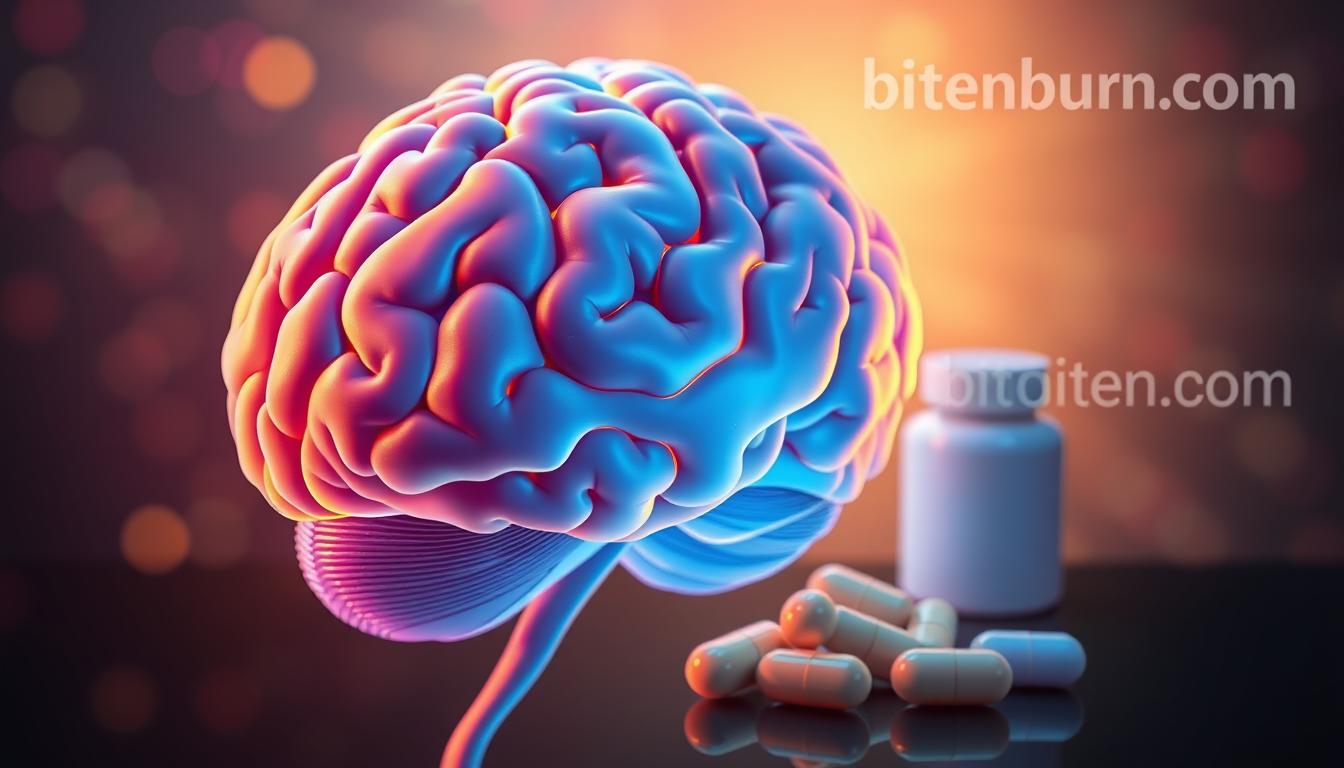
[…] shift is occurring in the way people eat, with 25% of 25- to 34-year-old Americans identifying as vegans or vegetarians, according to a 2019 article in The Economist. This trend is driven by a growing awareness of the […]
[…] the intricate relationship between our diet and brain health is crucial for maintaining mental clarity and overall well-being. The food we eat plays a […]
[…] cognitive function, and overall mental wellbeing. The brain and gut are linked through the central nervous system and the enteric nervous system, often referred to as the “second […]
[…] Explore various food categories that can help ease anxiety, including omega-3 rich foods and probiotics. […]
[…] making it a natural way to rehydrate. Buttermilk, or lassi, is another excellent choice. Its probiotics aid digestion while providing a cooling […]
[…] Discover how daily food consumption impacts anxiety levels and mental wellbeing. […]